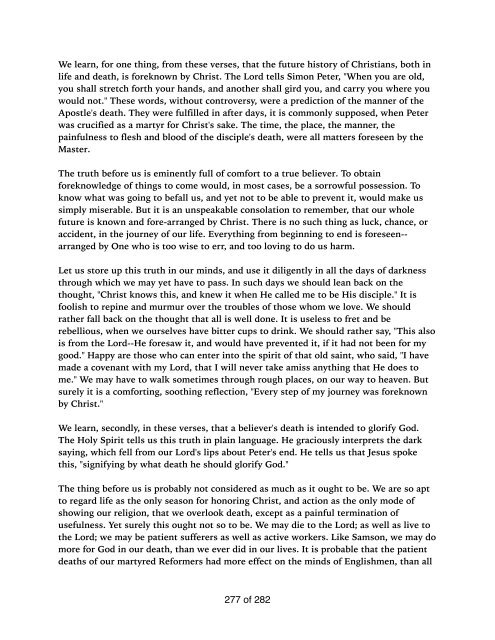The Gospel of John By J.C. ryle
Expository Thoughts on the Gospels Volume 4: John. Ignorance of Scripture is the root of every error in religion, and the source of every heresy. To be allowed to remove a few grains of ignorance, and to throw a few rays of light on God's precious word, is, in my opinion, the greatest honor that can be put on a Christian.
Expository Thoughts on the Gospels Volume 4: John. Ignorance of Scripture is the root of every error in religion, and the source of every heresy. To be allowed to remove a few grains of ignorance, and to throw a few rays of light on God's precious word, is, in my opinion, the greatest honor that can be put on a Christian.
Create successful ePaper yourself
Turn your PDF publications into a flip-book with our unique Google optimized e-Paper software.
We learn, for one thing, from these verses, that the future history <strong>of</strong> Christians, both in<br />
life and death, is foreknown by Christ. <strong>The</strong> Lord tells Simon Peter, "When you are old,<br />
you shall stretch forth your hands, and another shall gird you, and carry you where you<br />
would not." <strong>The</strong>se words, without controversy, were a prediction <strong>of</strong> the manner <strong>of</strong> the<br />
Apostle's death. <strong>The</strong>y were fulfilled in after days, it is commonly supposed, when Peter<br />
was crucified as a martyr for Christ's sake. <strong>The</strong> time, the place, the manner, the<br />
painfulness to flesh and blood <strong>of</strong> the disciple's death, were all matters foreseen by the<br />
Master.<br />
<strong>The</strong> truth before us is eminently full <strong>of</strong> comfort to a true believer. To obtain<br />
foreknowledge <strong>of</strong> things to come would, in most cases, be a sorrowful possession. To<br />
know what was going to befall us, and yet not to be able to prevent it, would make us<br />
simply miserable. But it is an unspeakable consolation to remember, that our whole<br />
future is known and fore-arranged by Christ. <strong>The</strong>re is no such thing as luck, chance, or<br />
accident, in the journey <strong>of</strong> our life. Everything from beginning to end is foreseen--<br />
arranged by One who is too wise to err, and too loving to do us harm.<br />
Let us store up this truth in our minds, and use it diligently in all the days <strong>of</strong> darkness<br />
through which we may yet have to pass. In such days we should lean back on the<br />
thought, "Christ knows this, and knew it when He called me to be His disciple." It is<br />
foolish to repine and murmur over the troubles <strong>of</strong> those whom we love. We should<br />
rather fall back on the thought that all is well done. It is useless to fret and be<br />
rebellious, when we ourselves have bitter cups to drink. We should rather say, "This also<br />
is from the Lord--He foresaw it, and would have prevented it, if it had not been for my<br />
good." Happy are those who can enter into the spirit <strong>of</strong> that old saint, who said, "I have<br />
made a covenant with my Lord, that I will never take amiss anything that He does to<br />
me." We may have to walk sometimes through rough places, on our way to heaven. But<br />
surely it is a comforting, soothing reflection, "Every step <strong>of</strong> my journey was foreknown<br />
by Christ."<br />
We learn, secondly, in these verses, that a believer's death is intended to glorify God.<br />
<strong>The</strong> Holy Spirit tells us this truth in plain language. He graciously interprets the dark<br />
saying, which fell from our Lord's lips about Peter's end. He tells us that Jesus spoke<br />
this, "signifying by what death he should glorify God."<br />
<strong>The</strong> thing before us is probably not considered as much as it ought to be. We are so apt<br />
to regard life as the only season for honoring Christ, and action as the only mode <strong>of</strong><br />
showing our religion, that we overlook death, except as a painful termination <strong>of</strong><br />
usefulness. Yet surely this ought not so to be. We may die to the Lord; as well as live to<br />
the Lord; we may be patient sufferers as well as active workers. Like Samson, we may do<br />
more for God in our death, than we ever did in our lives. It is probable that the patient<br />
deaths <strong>of</strong> our martyred Reformers had more effect on the minds <strong>of</strong> Englishmen, than all<br />
277 <strong>of</strong> 282

















